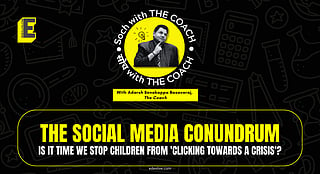
The news: The Australian Parliament has passed the world's first law banning social media use for children under the age of 16.
The mission: To evaluate the pros and cons of such a law if implemented in India.
The message: To expose the dark reality of social media and why taking action now could save a generation.
The intent: To protect children from the psychological damage caused by social media — a reality some deny, others ignore, and most dismiss as trivial.
Dear parents,
This week’s column comes with a strong appeal and a critical message for you. Social media is no longer just a harmless distraction — it’s a minefield of dangerous trends, sometimes devastating opinions, and disastrous behaviours. Some exploit loopholes in these platforms to post highly inappropriate and harmful content, tricking algorithms to circulate it widely.
From hyper-sexualised videos disguised as “relaxation” content to explicit posts masquerading as art, the problem has spiralled out of control. The worst offenders go as far as posting obscene reels — all on mainstream platforms like Instagram, Facebook, and YouTube. It’s shocking, disgusting, and dangerously accessible.
While governments debate regulations, parenting is your first line of defence. Be vigilant, not oppressive. Protect your children’s online presence without suffocating their individuality.
Even though I usually side with the youth, this issue hits differently. Social media is doing more harm than good for young minds.
Here’s why:
1. Mental Health SOS
Social media isn’t just about fun anymore — it’s become a breeding ground for FOMO (a GenZ term for fear of missing out), insecurity, and stress. Kids constantly compare themselves to filtered, curated lives and feel like they don’t measure up.
A 2022 Oxford study confirmed the obvious: the more time spent on social media, the worse children’s anxiety, depression, and self-esteem issues become.
2. Cyberbullying: Log out to opt-out
The internet is no safe haven for kids. United Nations International Children's Emergency Fund (UNICEF) reports that one in three children globally faces online bullying. In India, with its massive user base, the risk multiplies. Shielding kids from these toxic platforms could spare them the relentless trolling and harassment that leave long-lasting scars.
3. Classroom over clickbait
Even as adults, we fall prey to doom-scrolling; how can we expect children to resist?
Excessive screen time crushes focus, fries attention spans and sabotages academic performance. Banning social media would free kids to redirect their energy toward real learning, meaningful hobbies, and forging authentic connections.
4. Privacy isn’t child’s play
Children have no concept of the dangers lurking online. From predators grooming kids to identity theft, the risks are chilling. Keeping kids away from social media doesn’t just protect their privacy — it could save lives.
But it’s not that simple...
Before we get carried away, let’s acknowledge the flipside:
1. The digital divide
Social media isn’t all bad — it’s a treasure trove of learning opportunities. Platforms like YouTube serve as virtual classrooms. A ban might leave children ill-equipped for a tech-driven future, especially in rural India where access to educational resources is limited.
2. Parents vs policing
Parenting is about teaching responsibility, not enforcing bans. Critics argue that guiding children to navigate social media safely is more effective than cutting them off entirely.
3. Bypassing the ban
Kids today are tech-savvy and determined. Virtual Private Networks (VPNs), fake accounts, and shared devices are just a few ways they will use to circumvent restrictions, making enforcement almost impossible.
4. Stifling expression
Social media can empower children to share their voices, explore creativity, and advocate for causes. A ban could stifle their ability to engage meaningfully with the world.
India’s socio-cultural landscape makes implementing a ban complicated. Here’s what we stand to gain — and lose:
What we might gain
Bye, screen addiction: The National Commission for Protection of Child Rights (NCPCR) reports rising screen addiction among kids. A ban could break this cycle and foster healthier habits.
Hello, family time: Without online distractions, families might reconnect and revive the cultural traditions that define us as Indians.
What we risk losing
Rural kids left behind: Urban children may find alternative resources, but rural kids could lose access to critical online education.
EdTech takes a hit: Social media is vital for India’s EdTech sector. A ban could disrupt this growing industry.
Instead of banning social media outright, India could adopt a balanced approach:
1. Platforms that play nice
Promote safe platforms like YouTube Kids, but ensure stronger safeguards to prevent harmful content from slipping through.
2. Teach tech wisdom
Incorporate digital literacy into school curriculums. Teach kids about cyber safety, ethical tech use, and the consequences of oversharing.
3. Empower parents
Provide tools and training to help parents set healthy boundaries for their children’s online activities.
4. Nationwide awareness campaigns
Launch relatable, nationwide campaigns to highlight the dangers of excessive social media use.
5. Content moderation, not isolation
Work with platforms to enforce stricter age-appropriate content regulations instead of restricting access entirely.
Final thoughts: Let’s swipe right on balance
Australia’s bold move is commendable, but India needs a nuanced approach. Social media isn’t the enemy — it’s how we use it that matters.
Kids need guidance, not isolation. By teaching them to navigate the digital world responsibly, we can help them reap its benefits while avoiding its pitfalls. Let’s create a generation that thrives online and offline.
With regards,
Adarsh Benakappa Basavaraj
Your Mindful Coach
